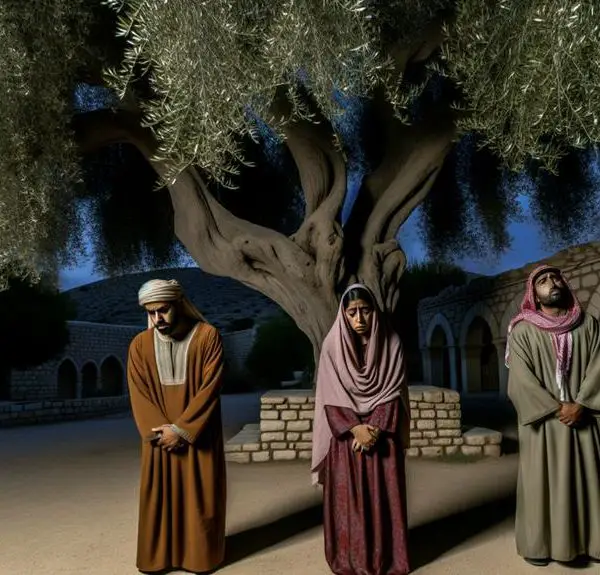Study the remarkable journey of Abram in Genesis Chapter 12, where faith, obedience, and divine covenants shape the course of biblical history.

Bible Study – The Book of Genesis – Chapter 12 – Summary and Analysis
In Genesis Chapter 12, you encounter a pivotal event: God's covenant with Abram. It's here that Abram's obedience, born of firm faith, becomes a central theme. You'll also explore Sarai's intimate struggles and her transformative influence. Through Pharaoh's deceptive actions and consequential plagues, themes of repentance, morality, and divine intervention are amplified. The covenant promises land, descendants, and blessings, laying the groundwork for God's redemptive plan. By probing further into this chapter, you'll unearth details that bring richness to these experiences – quite a journey awaits you.
Key Takeaways
- Genesis 12 marks God's covenant with Abram, demonstrating his obedience and faith.
- Sarai, Abram's wife, represents female struggles and influence in biblical narratives.
- Pharaoh's deception leads to plagues, but his repentance shows themes of divine intervention and morality.
- God's covenant with Abram promises land, descendants, and blessings, laying the foundation for redemptive plans.
- Abram's journey reflects faith amid uncertainty and resilience, offering lessons on spiritual migration and obedience.
Chapter 12: Brief Summary

In Genesis Chapter 12, you'll encounter a pivotal moment in biblical history, where God establishes His covenant with Abram, setting the stage for a series of profound theological implications. This chapter marks the commencement of Abram's migration, a significant event that illustrates how God's divine encounters often prompt radical life changes.
The narrative of Abram's migration is an emblematic instance of faith and obedience. God commands Abram to leave his homeland, promising to make him the father of a great nation. Despite the risk and uncertainty, Abram chooses faith over fear and commences on a journey towards the promised land. This migration isn't just a physical journey, but also a spiritual voyage, where Abram's faith is tested and refined.
The Divine Encounter signifies God's direct intervention in human affairs. It's God reaching out to humanity, initiating a relationship, and setting forth His divine plan. In Abram's case, the divine encounter is a life-altering revelation. It changes Abram's trajectory, redirecting him from a path of obscurity to a journey of faith, destiny, and promise.
Thus, Genesis 12 serves as a framework for understanding God's covenantal relationship with humanity, clearly manifested in Abram's migration and divine encounter.
Unpacking Abram's Call
Delving into Abram's call, you'll find it's more than a simple command; it's a divine invitation, a profound theological event that sets the stage for the unfolding covenant narrative. This isn't just about Abram's obedience, it's about Divine Guidance, about God's direct intervention in human affairs.
The divine call to Abram is a pivotal moment in the Genesis narrative. It's here, in God's imperative to Abram to "Go from your country, your people and your father's household to the land I will show you" (Genesis 12:1), that we see the genesis of Abram's obedience. God's directive isn't a suggestion; it's a command, but it's also a promise. It's a promise of blessing, of protection, and of great purpose.
Abram's obedience isn't just a matter of compliance. It's a decision steeped in faith and trust. Abram doesn't know where he's going, he doesn't have a roadmap, but he trusts in the Divine Guidance. He steps out in faith, not knowing the destination, but assured of the Guide. This is the essence of Abram's call – a journey of faith, driven by obedience and guided by divine direction.
Sarai's Role and Significance

What role, you may ask, does Sarai play in this intricate divine narrative and why is her significance so profound? Sarai's influence as the wife of Abram is undeniable. She's not merely a background character; her actions and experiences directly shape the narrative, bolstering its theological teachings.
Often, Sarai's influence is subtle yet impactful. For instance, her barrenness becomes a catalyst for God's promise of progeny to Abram. This scenario illustrates the divine intervention in human affairs, a recurring theme throughout the Bible.
Sarai also represents female representation in the Genesis narrative. In a mainly male-dominated society, her profound influence is remarkable, challenging traditional norms. The Bible doesn't shy away from her struggles, her doubts, or her humanity. These aspects create a multi-faceted character, offering a more inclusive perspective of female representation in biblical times.
Pharaoh's Encounter: A Closer Look
While you're exploring the narrative of Genesis, you'll likely find Pharaoh's encounter with Abram and Sarai to be an important, multi-faceted event that's ripe for theological analysis. This encounter, marred by Pharaoh's deception, provides a unique window into the cultural and moral landscape of Egyptian culture during that era.
Here, we'll focus on four key aspects of this encounter:
- The Motive: Pharaoh's deception stems from his desire to acquire Sarai. This reveals a power dynamic inherent in Egyptian culture, where royalty often acted out of self-interest.
- The Deception: Pharaoh is deceived about Sarai's marital status, highlighting Abram's fear and lack of trust in God's protection.
- The Consequence: The plagues inflicted on Pharaoh and his household demonstrate God's sovereignty and protective nature towards his chosen people.
- The Outcome: Pharaoh's realization of the truth leads to his repentance, showing that even the mighty can be humbled and corrected.
As you investigate further into this encounter, consider how these elements reflect on the broader themes of faith, morality, and divine intervention in Genesis. Each facet of this event serves as a confirmation to the intricate weaving of human choices and divine providence in our spiritual journey.
God's Covenant: Deep Dive

Moving from Pharaoh's encounter with Abram and Sarai, let's now turn our attention to another pivotal moment in Genesis – God's covenant with Abram. This covenant signifies a major turning point in Abram's life and God's plan for humanity.
The Covenant Importance cannot be underscored enough. It is a divine contract, a sacred commitment between God and His chosen people. The covenant represents God's unyielding faithfulness, His constant willingness to guide and protect Abram, even in the face of adversity. It's a promise of land, descendants, and blessings.
This covenant, essentially, encapsulates Divine Promises. These promises aren't just material or temporal, but spiritual and eternal. God promised Abram not only land and progeny but also that through him, all families of the earth would be blessed. God, in His infinite wisdom, was establishing a line through which the Savior of the world, Jesus Christ, would come.
Thus, the covenant illustrates the depth of God's commitment to humanity, His grand design, and His unchanging promises. It forms a foundational cornerstone in the story of Salvation, setting the stage for the future unfolding of God's redemptive plan.
Analysis of Key Verses
Delving into the key verses, you'll find a wealth of significance and profound messages that further illuminate the import of God's covenant with Abram.
- Genesis 12:1 – "The LORD had said to Abram, 'Go from your country, your people and your father's household to the land I will show you.'" This verse highlights Abram's obedience, as he willingly leaves his homeland trusting in God's promise.
- Genesis 12:2 – "'I will make you into a great nation, and I will bless you; I will make your name great, and you will be a blessing.'" This verse emphasizes the Divine intervention in Abram's life.
- Genesis 12:4 – "So Abram went, as the LORD had told him." Again, Abram's obedience is underscored here. His faith in God's promise leads him to act decisively.
- Genesis 12:7 – "The LORD appeared to Abram and said, 'To your offspring I will give this land.'" This verse reiterates the Divine intervention, showing God's active role in fulfilling His promise.
In these verses, Abram's obedience and the Divine intervention become key themes of the narrative, setting the stage for God's unfolding plan in Abram's life.
Themes and Symbolism Explored

As you navigate the intricate landscapes of Genesis 12, you'll encounter a wealth of symbolism and thematic content. You'll find yourself immersed in a narrative rich with theological implications, providing a foundation for much of the Christian understanding of faith and obedience. This exploration will shed light on the symbolic elements and recurring themes that shape this seminal chapter in the Bible.
Genesis 12: Symbolic Elements
Peeling back the layers of Genesis 12, we're drawn into a rich tableau of symbols and themes that deepen our theological understanding. Here, we witness Abram's Migration, which is filled with symbolic sacrifices and profound lessons.
- Abram's Migration: It symbolizes obedience to divine commands, and the exploration of faith required for spiritual growth.
- Symbolic Sacrifices: These emphasize the importance of surrender, trust, and absolute faith in God's promises.
- The Land of Canaan: Represents the divine blessings and the promise of a prosperous future.
- Pharaoh's Plague: Serves as an indicator of God's protection over Abram and Sarai.
Each symbol intricately interweaves to create a powerful narrative, urging you to further explore the spiritual journey of Abram and the early formation of faith.
Themes in Genesis 12
While you're pondering the symbols in Genesis 12, don't forget to contemplate the overarching themes that further enrich this biblical narrative. Two significant themes in this chapter are Divine Intervention and Cultural Context.
Divine Intervention in Genesis 12 is seen when God intervenes in Abram's life, promising him blessings and a great nation to come from his lineage. This theme illustrates God's active involvement and sovereignty in human history.
Cultural Context is seen in the depiction of the ancient Near East, where Abram lived. Understanding the cultural context helps shed light on the narrative and gives it depth.
Theme |
Description |
|---|---|
Divine Intervention |
God's active involvement in Abram's life, promising blessings and descendants. |
Cultural Context |
The depiction of the ancient Near East providing depth and understanding. |
Remember to always consider these themes as you explore further into Genesis 12.
Lessons From Genesis 12
In delving into Genesis 12, you'll uncover profound theological lessons that offer deep insights into faith, obedience, and divine promise. The story of Abram's journey manifests two key facets: Abrahamic Leadership and Spiritual Migration.
- Abrahamic Leadership: You'll notice that Abram's leadership is deeply rooted in his faith. His decisions, though seemingly risky, are driven by his unyielding trust in God. This serves as a lesson in spiritual leadership, highlighting the importance of faith as a guiding principle in your life decisions.
- Spiritual Migration: Abram's physical journey from Haran to Canaan symbolizes a spiritual migration. It is a transformative journey, underlining the importance of leaving the familiar behind to embrace God's promises. This teaches you the significance of stepping out of your comfort zone in order to grow spiritually.
- Divine Promise: Genesis 12 emphasizes the significance of God's promise to Abram. This underscores the concept of divine providence and the assurance it provides.
- Obedience: Abram's obedience, despite the uncertainties, underscores the importance of submission to divine will. It shows the role of obedience in accessing God's promises.
Reflecting on Abram's Faith Journey

Reflect on Abram's divine call, a moment that not only redefined his life but set the course for a legacy of faith. Consider his response to uncertainty, how his faith became a beacon in the face of the unknown. It's in this journey, you'll find the theological depth of Abram's faith and the profound resonances it has for us today.
Abram's Divine Call
Abram's faith journey, one marked by divine intervention, is a proof of his unwavering belief and obedience to God's call. Your understanding of Abram's obedience will deepen when you grasp the depth of his faith. Now, consider these four points:
- The divine calling: God's call wasn't a mere suggestion, but a divine intervention that demanded Abram's response.
- Abram's obedience: Upon hearing God's call, Abram didn't hesitate. He obeyed, demonstrating his faith in God's plans.
- The journey of faith: Abram's journey wasn't smooth-sailing. It was filled with tests and trials, but his faith remained unshaken.
- The reward of obedience: Abram's obedience led to God's blessings, establishing his lineage as chosen by God.
In this narrative, we see a vivid depiction of faith, obedience, and divine intervention.
Faith Amid Uncertainty
Despite the uncertainty that loomed, it's important to highlight Abram's extraordinary ability to maintain his faith during the trials and tribulations of his journey, showcasing a spiritual resilience that speaks volumes about his character and his relationship with God.
His story teaches you valuable lessons in Uncertain Faith and Doubt Handling. When faced with doubt, Abram didn't abandon his faith, he rather clung to it. It's this unwavering belief that's admirable and inspiring.
To explore further, let's examine a table highlighting key aspects of Abram's faith journey:
Abram's Faith Journey |
Lessons Learned |
|---|---|
Uncertain Faith |
Trust in God during uncertainty |
Doubt Handling |
Clinging to faith amidst doubt |
Spiritual Resilience |
Maintaining faith through trials |
The journey of faith isn't devoid of uncertainty or doubt, but like Abram, faith must be maintained.
Frequently Asked Questions
What Are the Historical and Cultural Contexts of Genesis Chapter 12?
In Genesis chapter 12, you're witnessing Abram's journey, a pivotal point in ancient Hebrew history. This chapter reflects the nomadic culture of the time. Sarai's role, though seemingly secondary, is vital to the narrative. She's part of God's promise to Abram, influencing their journey. The historical and cultural contexts are deeply intertwined with the theology, providing a rich understanding of the text's significance. This chapter lays the foundation for Israel's future as God's chosen people.
How Does Chapter 12 Connect to the Rest of the Book of Genesis?
Chapter 12's significance to the rest of Genesis is profound. It introduces the Abrahamic Covenant, setting the stage for God's promise to Abraham's descendants. You see, it's a pivot point, changing the narrative from general humanity to a specific lineage. This chapter's events impact the rest of Genesis, shaping the story of Abraham's descendants, their struggles, and victories. As a result, it's an essential link connecting the past, present, and future threads of the Genesis narrative.
What Other Biblical Passages Relate to the Events in Genesis Chapter 12?
You'll find Abram's faith reflected in Hebrews 11:8-10, where his obedience to God's call is praised. Sarai's dilemma in Genesis 12, when she's taken by Pharaoh, is similar to the situation in Genesis 20 with Abimelech. Both instances highlight the dangers of deception, but also God's faithfulness in protecting His chosen people. These passages deepen your understanding of Genesis 12, showing its connection to broader biblical narratives.
What Are Differing Scholarly Interpretations of Genesis Chapter 12?
You'll find varied scholarly interpretations of Genesis chapter 12. Some focus on Abram's faithfulness, highlighting his obedience to God's command to leave his homeland. Others scrutinize Sarai's role, debating her submission and the implications it has on gender dynamics. Each interpretation brings unique insights, and they may not always agree. Remember, biblical analysis often requires an open mind to different perspectives.
How Has Genesis Chapter 12 Influenced Christian Theology and Practice?
Genesis 12, with Abram's faithfulness and covenant promises, has deeply influenced Christian theology and practice. Imagine you're at a baptism, the promises made mirror those God made to Abram. This chapter highlights faith in God's promises, which Christians emulate in their lives. It's an embodiment of trust and obedience, shaping the Christian concept of a personal relationship with God. It's a cornerstone, reminding you of God's faithfulness and the blessings that come from it.



Sign up